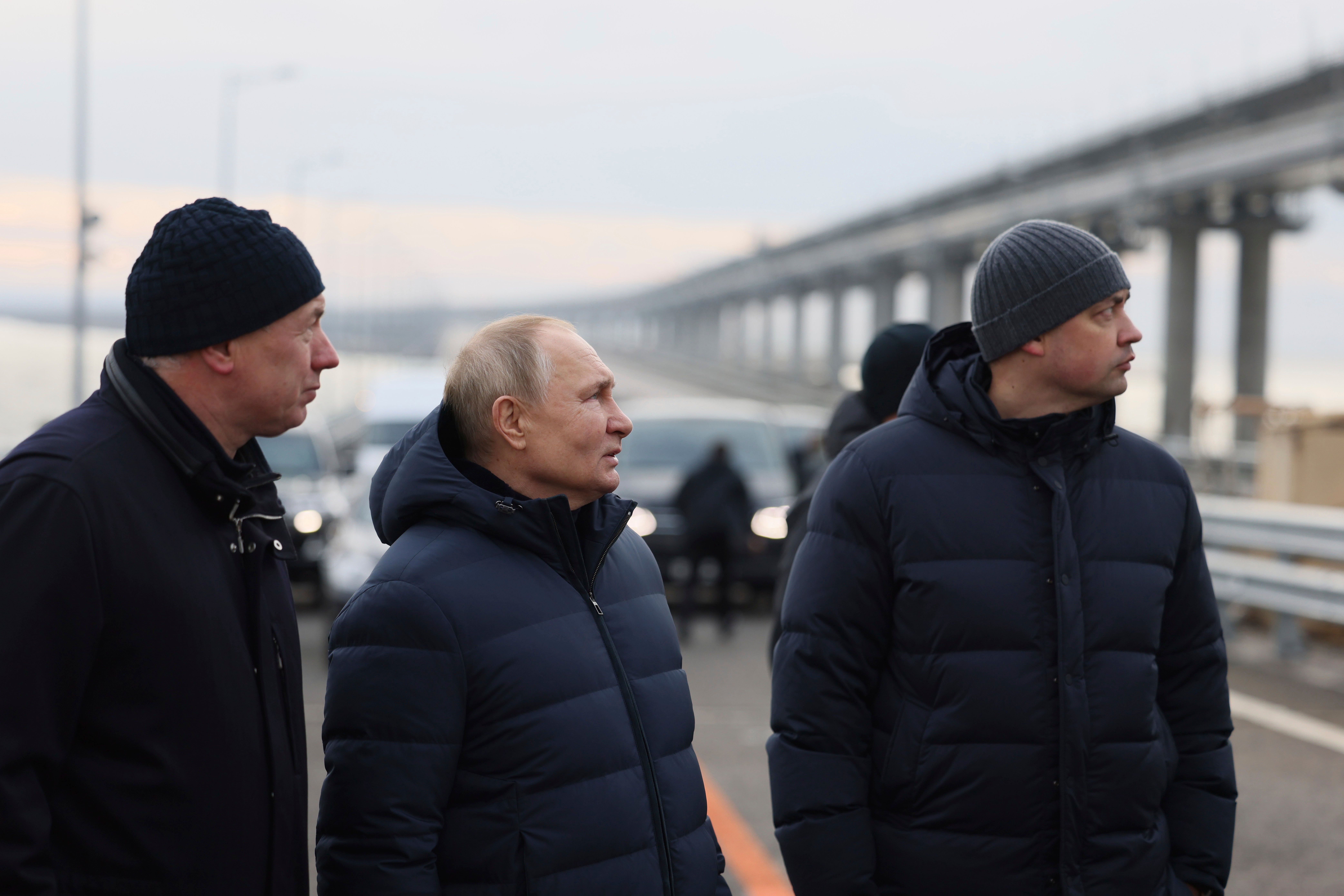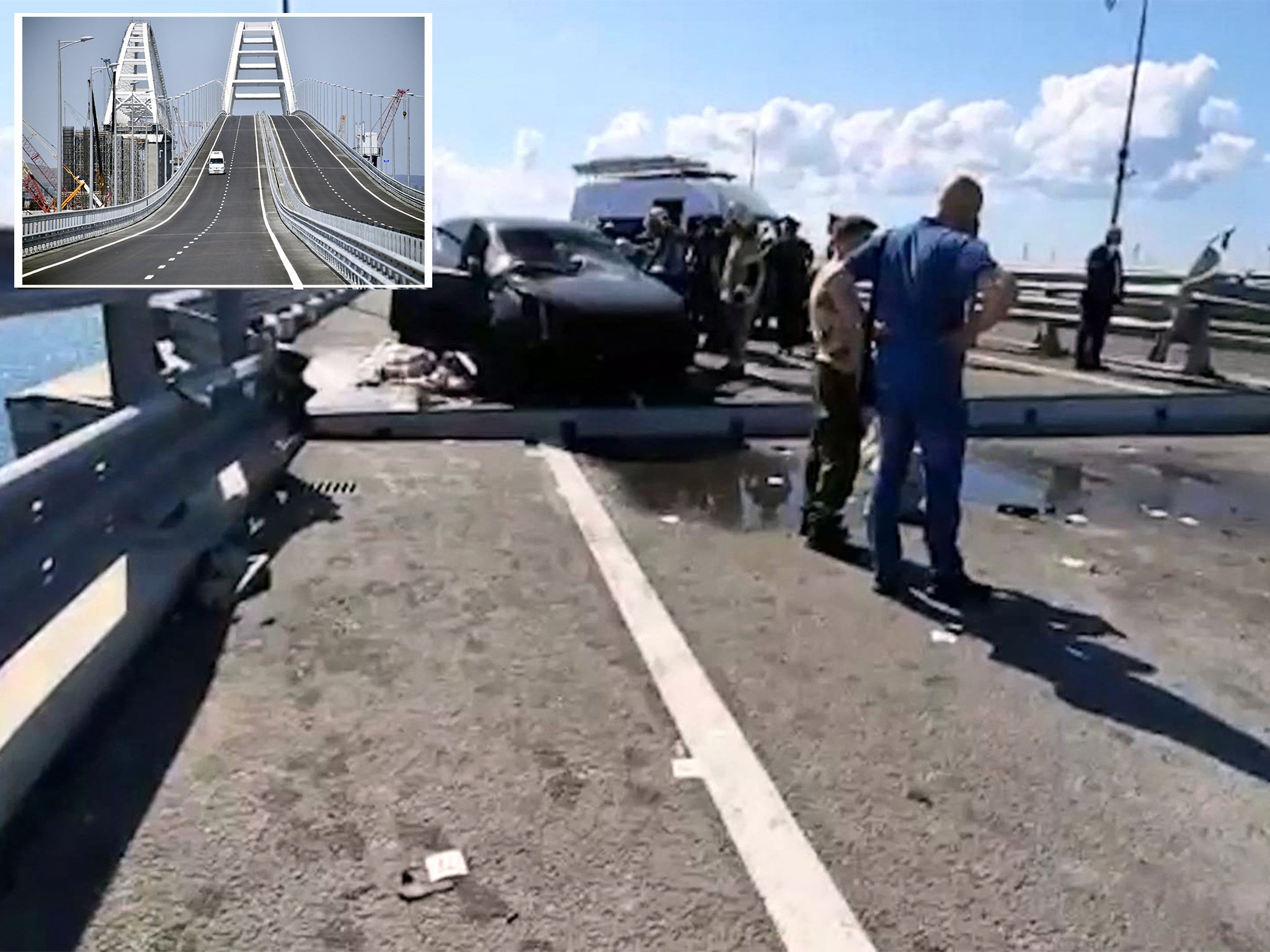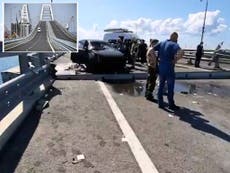A pre-dawn deadly assault on the Kerch Bridge is the second such attack in just nine months. As Ukraine pushes ahead with a summer counteroffensive, it amounts to a personal jab at Vladimir Putin, who has often boasted about its construction.
The 12-mile rail and road structure – the longest in Europe – was a £2.7bn prestige project and was opened by Mr Putin five years ago. It links the Russian mainland and occupied Crimea, which Moscow illegally annexed from Ukraine in 2014. When it was opened, Mr Putin boasted that Russian tsars had dreamed of building this “miracle” but had never succeeded. Russian state media hailed it as the “construction of the century”.
Since Russia launched a full-scale invasion of Ukraine last February, the bridge has morphed into a military supply lifeline for Moscow’s men on the battlefield. In the summer it is also gridlocked with Russian tourists wanting to holiday in Crimea – a popular holiday destination, despite the war rumbling mere miles away.
In Ukraine, the bridge has become a focus of anger as a symbol of Russia’s long-standing efforts to take Ukrainian territory and to “Russify” the territory.
Losing the bridge would undermine Russia’s supply lines and potentially cut off tens of thousands of Russian holidaymakers in Crimea from the mainland.
Symbolically, any damage to the structure – which lies deep in Russian-occupied territory – means a great deal. And that is why it has come under fire.
In October, it was bombed just a day after Mr Putin’s 70th birthday. Russia blamed that attack on Ukraine, which initially denied the accusations but then indirectly acknowledged that it had been designed to “break the logistics of the Russian army”. Shortly afterwards, Russia launched a slew of strikes against Ukrainian cities and power supply stations, and Mr Putin ordered immediate repairs to the bridge. In December, he personally drove across the bridge in a Mercedes.
In the early hours of Monday, the bridge came under fire again: Russia said two parents were killed and their 14-year-old daughter was severely wounded in a “terrorist” attack by Ukrainian sea drones. Footage shared on both Russian and Ukrainian social media showed a severed part of the road edged with buckled metal barriers, with ambulances and cars backed up in the confusion. Road and rail traffic was halted for hours.
Ukraine’s military suggested the attack could be some kind of provocation by Russia itself, because it occurred on the day on which Moscow was due to decide whether to extend a UN-brokered deal allowing the export of grain via the Black Sea. However, Ukrainian media reported that Ukraine’s Security Service had been behind the incident, citing unidentified sources. Ukraine’s military intelligence directorate said the bridge was a legitimate target because it had become a “large logistical hub for moving [Russian] forces and assets deep into the territory of Ukraine”.

Either way, Russian politicians quickly said that Moscow should respond by destroying Ukrainian infrastructure rather than discussing the grain deal.
The agreement to allow grain exports was brokered by the UN and Turkey last year, and aimed to relieve a growing global food-security crisis. It allowed Ukraine – the world’s fifth-largest exporter of grain – to resume shipping food from its southern posts despite the conflict.
Kremlin spokesperson Dmitry Peskov said Russia had decided to halt the agreement, but claimed the decision had nothing to do with the bridge attack. It is not clear if Russia will resume the deal, which it has tried to back out of before.
Meanwhile, the Security Service of Ukraine tweeted a reference to a popular lullaby, tweaked to say that the bridge “went to sleep again”.
Subscribe to Independent Premium to bookmark this article
Want to bookmark your favourite articles and stories to read or reference later? Start your Independent Premium subscription today.










Join our commenting forum
Join thought-provoking conversations, follow other Independent readers and see their replies
Comments